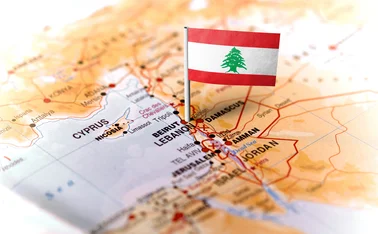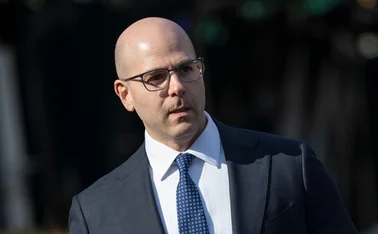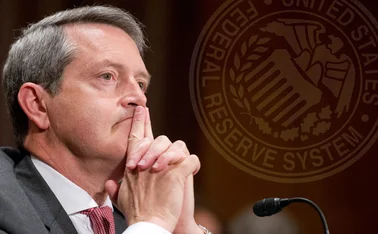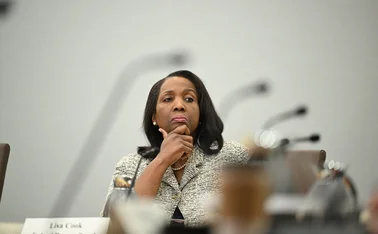
IMF must defend reform in Ukraine – Gontareva
Lawmakers accept Smolii’s resignation as former governor says president has “fooled” IMF

The International Monetary Fund must act decisively to protect the independence of Ukraine’s central bank, former governor Valeria Gontareva says.
The IMF must suspend payments to Ukraine if the country’s government does not appoint an independent central bank governor, Gontareva tells Central Banking. National Bank of Ukraine governor Yakiv Smolii submitted his resignation on July 1, saying he had been subject to “systematic political pressure that denied fulfillment of my duties as the governor”.
Ukrainian lawmakers accepted his decision today (July 6), despite some observers hoping that they might refuse. Gontareva says she is not surprised by the lawmakers’ decision to accept her successor’s resignation. “They were ready for his resignation and expecting it – of course they were,” she says. “They helped drive him to it.”
Gontareva says the most important factor behind Smolii being forced out was a campaign organised by Ukrainian billionaire Ihor Kolomoisky. She says that without decisive IMF action, Ukraine’s president Volodymyr Zelensky will probably appoint a central bank governor who would give in to Kolomoisky’s campaign.
Gontareva says she faced major pressure in her time as NBU governor from 2014 to 2017. But she says that Smolii had faced an even worse situation in recent months.
“I am not surprised he went: the pressure had become unbearable,” she says. “There was sustained political pressure, both from the government and from allies of Kolomoisky in parliament, like Mr [Oleksandr] Dubinsky.” On November 28, the NBU under Smolii began a legal action against Dubinsky, a prominent lawmaker, accusing him of having published false rumours against the central bank.
“These lawmakers made up endless scandals, falsely accusing first me and then Smolii of corruption and dishonesty,” Gontareva says. “And there was physical pressure as well.”
Gontareva has accused Kolomoisky of being behind the burning down of her house and an armed raid on her Kyiv flat. Smolii said he believed Kolomoisky had been behind the attacks. Several current and former senior central bank officials were arrested on corruption charges in November 2019. Smolii and Gontareva said at the time that the charges were baseless and politically motivated.
Kolomoisky is trying to regain control of the country’s largest lender, PrivatBank, which was nationalised after the central bank accused him of massive fraud. He was one of two co-owners of PrivatBank, before it was nationalised in December 2016 by Ukraine’s then-president Petro Poroshenko at the central bank’s request.
The central bank commissioned a report by US-based firm Kroll accusing Kolomoisky and his co-owner Gennady Bogolyubov of having stolen at least $5.5 billion from the firm. Kolomoisky and Bogolyubov have denied all charges of wrong-doing. Judges in the High Court in London ruled in 2019 that there was a “good arguable case” that both men had stolen the missing money.
Gontareva says that there is a real danger that President Zelensky will now appoint a central bank governor who will reverse the central bank’s reforms.
“The IMF and the G7 countries have said lots of nice things about ‘respecting central bank independence’, but that has had no impact. When the central bank governor resigns, you can’t just issue these statements,” she says. “To defend the reforms we made, the IMF should announce that it is not making any further payments to Ukraine unless Zelensky appoints a governor who will safeguard reforms.”
To defend the reforms we made, the IMF should announce that it is not making any further payments to Ukraine unless Zelensky appoints a governor who will safeguard reform
Valeria Gontareva, former governor of the National Bank of Ukraine
She says the IMF should even consider demanding the repayment of its previous support for Ukraine. “Those tranches were paid under the agreement that there would be central bank independence and economic reform,” she says. “If those conditions are no longer effective, the IMF should say Ukraine must pay its aid back.”
Gontareva argues that Kolomoisky could effectively regain control of PrivatBank even if he is not formally named as its owner. “The first step is for Zelensky to name a central bank governor. Unfortunately I assume the new governor will be loyal to Zelensky and Kolomoisky.” Good candidates for governor would oppose giving Kolomoisky effective control of PrivatBank, she says, “but bad ones will accept”.
Another key aim, she says, will be for the Constitutional Court to block the law on the independence of the deposit guarantee scheme. This played a key role in the nationalisation of PrivatBank. “Then Kolomoisky will have won,” Gontareva says. “The government could do this – I think it would take them maybe six months.”
She added that Kolomoiksy has several other aims, including removing the team that has run PrivatBank since its nationalisation and stopping asset-recovery lawsuits. “The pressure wasn’t just on the central bank leadership, but on the leaders of PrivatBank,” Gontareva says.
The campaign also aims to make the central bank and the PrivatBank leadership drop lawsuits to recover the allegedly stolen assets, Gontareva says. The NBU and PrivatBank is pursuing legal actions against Kolomoisky and Bogolyubov in England, the US, Switzerland and Israel.
Ukraine’s parliament passed a law in May that formally safeguarded the nationalisation of PrivatBank after coming under strong public pressure from the IMF’s managing director. IMF head Kristalina Georgieva stated publicly on December 7 that it would only back further financial aid for Ukraine if the government supported financial reformers.
Ukraine received several billion dollars of IMF aid between 2015 and 2019 and was negotiating a new package. The Ukrainian parliament, with strong support from Zelensky’s administration, passed a law in effect guaranteeing the central bank’s reforms on May 13. Nine days later, the IMF announced it had approved a package worth $3.6 billion over the next 18 months.
But the aid must be disbursed in tranches. The IMF may decline to release further aid to Ukraine if it believes the government is not abiding by its conditions on supporting reform. The fund has made no public statement since Smolii’s resignation.
Gontareva says that Zelensky’s team has “fooled the IMF. They waited until they had the first tranche of IMF aid and then they put more pressure on Smolii”. Several observers have said that well-qualified economic policy-makers have recently left their roles as economy and finance ministers in Zelensky’s government. Gontareva says his team “has no economic or financial policy or knowledge”.
“Rozhkova will be the next target”
With Smolii’s resignation accepted, the NBU’s acting governor is first deputy governor Kateryna Rozhkova, who led the reform of the banking sector under Gontareva. The former governor says Rozhkova is well qualified to take over at the NBU.
“The best internal candidate is Kateryna Rozhkova, a real professional and reformer,” Gontareva says. But those qualities mean “Rozhkova will be their next target”.
A Ukrainian lawmaker brought a legal action against Rozhkova alleging she was corrupt and blocking her from carrying out her duties at the central bank last year. The lawsuit was upheld by a lower court but overturned on appeal. Smolii and Gontareva said at the time the lawmaker was acting at Kolomoisky’s request.
Gontareva says the the best external candidates to become governor are Vladislav Rashkovan and Oleksandr Pisaruk.
Rashkovan serves as alternate executive director at the IMF in Washington. Pisaruk is a former central bank deputy governor and chief executive of the Ukrainian subsidiary of Austria’s Raffeisen Bank. He was one of several former and serving senior central bank officials arrested on corruption charges in November.
But Gontareva says all good candidates from outside the bank would almost certainly decline the role. “Who would want to be a kamikaze?” she asks.
Only users who have a paid subscription or are part of a corporate subscription are able to print or copy content.
To access these options, along with all other subscription benefits, please contact info@centralbanking.com or view our subscription options here: www.centralbanking.com/subscriptions
You are currently unable to print this content. Please contact info@centralbanking.com to find out more.
You are currently unable to copy this content. Please contact info@centralbanking.com to find out more.
Copyright Infopro Digital Limited. All rights reserved.
As outlined in our terms and conditions, https://www.infopro-digital.com/terms-and-conditions/subscriptions/ (point 2.4), printing is limited to a single copy.
If you would like to purchase additional rights please email info@centralbanking.com
Copyright Infopro Digital Limited. All rights reserved.
You may share this content using our article tools. As outlined in our terms and conditions, https://www.infopro-digital.com/terms-and-conditions/subscriptions/ (clause 2.4), an Authorised User may only make one copy of the materials for their own personal use. You must also comply with the restrictions in clause 2.5.
If you would like to purchase additional rights please email info@centralbanking.com







